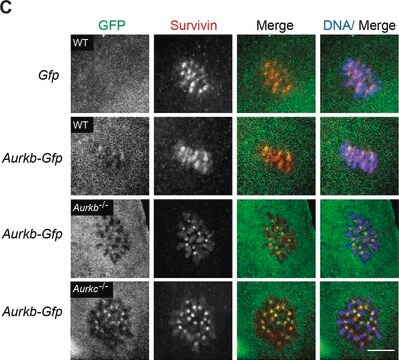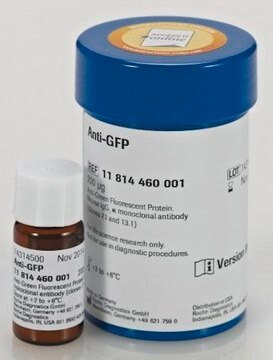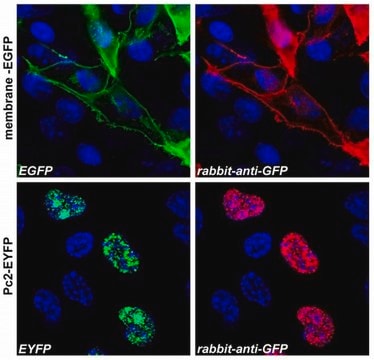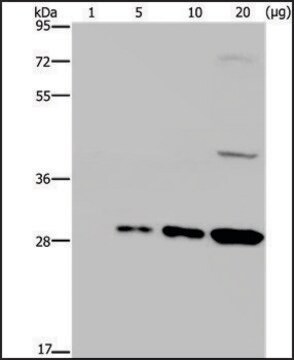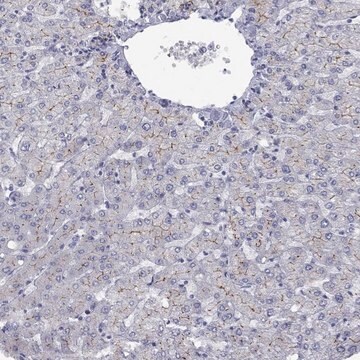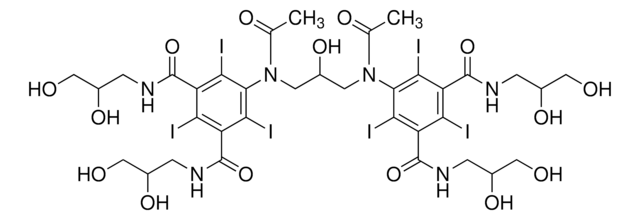MABE1906
Anti-Venus (YFP) Antibody, clone 5
clone 5
Sinônimo(s):
GFP(YFP), GFP(F46L)
Faça loginpara ver os preços organizacionais e de contrato
About This Item
Código UNSPSC:
12352203
NACRES:
NA.41
Produtos recomendados
Descrição geral
Green fluorescent protein (UniProt: P42212; also known as GFP) is encoded by the GFP gene in Aequorea victoria (Jelly Fish). GFP is a 27 kDa protein from jellyfish that serves as an energy-transfer acceptor. It transduces the blue chemiluminescence of the protein aequorin into green fluorescent light by energy transfer and it fluoresces in vivo upon receiving energy from the Ca2+-activated photoprotein aequorin. GFP has an absorption max at 395 nm and the emission peaks at 507 to 510 nm. However, the exact value of emission max depends on the environment of the chromophore. GFP has evolved into an important tool in cell biology research that displays stability under fixation conditions and is suitable for a variety of applications. Venus is a genetic mutant with F46L substitution in green fluorescent protein (GFP), derived from Aequorea victoria. Its excitation/emission peaks are 515/528 nm respectively and is often used as a donor-acceptor pair by researchers in FRET based co-localization studies. Compared to other fluorescent tags, Venus provides higher expression levels and better yields in preparative purifications. A fusion protein consisting of Venus and a defective mutant of p27 protein (p27K ) has been used to identify and isolate a population of quiescent cells and visualize the G0 to G1 transition. Clone 5 specifically detects only the Venus-tagged proteins. (Ref.: Nagai, T., et al. (2002). Nat. Biotechnol. 20(1); 87-90; Oki, T., et al. (2014). Sci. Rep. 4; Article 4012; Rana, MS., et al. (2018). Biochemistry 57(49); 6741-6751).
Especificidade
Clone 5 is a mouse monoclonal antibody that detects proteins labeled with Venus (YFP). It does not display cross-reactivity with mCherry, mRuby, or mClover.
Imunogênio
GST‐tagged full-length mVenus, a genetic mutant of GFP derived from Aequorea Victoria (Jelly fish).
Aplicação
Immunocytochemistry Analysis: A 1:500 dilution from a representative lot detected Venus (YFP) in NIH3T3 (L20V-9-11) cells (Courtesy of Li Ten and Kensaku Murano, Ph.D., Keio University School of Medicine, Tokyo Japan).
Western Blotting Analysis: A 1:250 dilution from a representative lot detected Venus (YFP) in HEK293T cells transfected with mVenus that was expressed using pCAGGS-Myc eukaryotic expression plasmid (Courtesy of Li Ten and Kensaku Murano, Ph.D., Keio University School of Medicine, Tokyo Japan).
Immunoprecipitation Analysis: A 1:1,000 dilution from a representative lot immunoprecipitated Venus (YFP) labeled proteins in pCAGGS-myc (negative) and pCAGGS-myc-mVenus (positive) HEK293T cell lysates (Courtesy of Li Ten and Kensaku Murano, Ph.D., Keio University School of Medicine, Tokyo Japan).
Western Blotting Analysis: A 1:250 dilution from a representative lot detected Venus (YFP) in HEK293T cells transfected with mVenus that was expressed using pCAGGS-Myc eukaryotic expression plasmid (Courtesy of Li Ten and Kensaku Murano, Ph.D., Keio University School of Medicine, Tokyo Japan).
Immunoprecipitation Analysis: A 1:1,000 dilution from a representative lot immunoprecipitated Venus (YFP) labeled proteins in pCAGGS-myc (negative) and pCAGGS-myc-mVenus (positive) HEK293T cell lysates (Courtesy of Li Ten and Kensaku Murano, Ph.D., Keio University School of Medicine, Tokyo Japan).
Qualidade
Isotype testing: Identity Confirmation by Isotyping Test. Isotyping Analysis: The identity of this monoclonal antibody is confirmed by isotyping test to be mouse IgG1.
Descrição-alvo
~35 kDa observed; 26.88 kDa calculated for GFP. Uncharacterized bands may be observed in some lysate(s).
forma física
Protein G purified
Purified mouse monoclonal antibody IgG1 in buffer containing 0.1 M Tris-Glycine (pH 7.4), 150 mM NaCl with 0.05% sodium azide.
Reconstituição
0.5 mg/mL. Please refer to guidance on suggested starting dilutions and/or titers per application and sample type.
Armazenamento e estabilidade
Stable for 1 year at +2°C to +8°C from date of receipt.
Outras notas
Species Reactivity Note: Aequorea victoria. Predicted to react with all species.
Exoneração de responsabilidade
Unless otherwise stated in our catalog or other company documentation accompanying the product(s), our products are intended for research use only and are not to be used for any other purpose, which includes but is not limited to, unauthorized commercial uses, in vitro diagnostic uses, ex vivo or in vivo therapeutic uses or any type of consumption or application to humans or animals.
Código de classe de armazenamento
12 - Non Combustible Liquids
Classe de risco de água (WGK)
WGK 1
Ponto de fulgor (°F)
Not applicable
Ponto de fulgor (°C)
Not applicable
Certificados de análise (COA)
Busque Certificados de análise (COA) digitando o Número do Lote do produto. Os números de lote e remessa podem ser encontrados no rótulo de um produto após a palavra “Lot” ou “Batch”.
Já possui este produto?
Encontre a documentação dos produtos que você adquiriu recentemente na biblioteca de documentos.
Nossa equipe de cientistas tem experiência em todas as áreas de pesquisa, incluindo Life Sciences, ciência de materiais, síntese química, cromatografia, química analítica e muitas outras.
Entre em contato com a assistência técnica